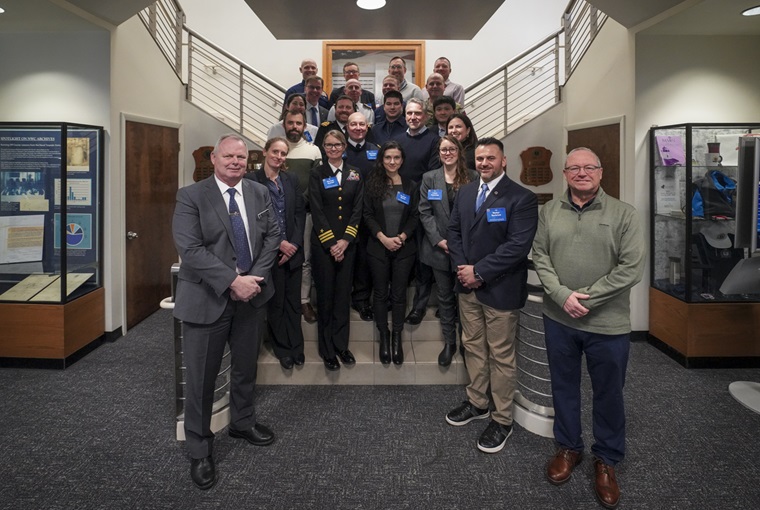Arctic Navies Discuss Integrated Deterrence at U.S. Naval War College Seminar

Newport, R.I – The U.S. Naval War College (NWC) hosted the 7th iteration of its Newport Arctic Scholars Initiative (NASI), a seminar series focused on integrated naval deterrence in the Arctic region, onboard Naval Station Newport, Jan. 23-25.
A collaborative endeavor between NWC’s Center for Naval Warfare Studies (CNWS) and International Programs Department (IP), the event brought together a cohort of 20 naval officers and scholars from Arctic and, for the first time, non-Arctic nations to analyze security implications of the evolving region and produce recommendations for heads of Navy and civilian government policymakers.
“The Newport Arctic Scholars Initiative is a bold agenda illustrating NWC’s long-standing commitment to advancing excellence in education, research, and international maritime cooperation - our college's three lines of effort,” said Rear Adm. Pete Garvin, president of NWC.
NASI 2024 participants included representatives from Canada, Denmark, Finland, Iceland, Norway, Sweden, United Kingdom, and the United States, plus an observer from Japan; NWC faculty and staff; external partners such as the Ted Steven Center for Arctic Security Studies, the U.S. Coast Guard Center for Arctic Studies and Policy, and others.
Welcoming participants, Rear Adm. Lars Saunes (ret.), former chief of the Royal Norwegian Navy, Chief of Naval Operations distinguished international fellow at NWC, and NASI lead scholar, further emphasized NWC’s commitment to education, research, and international maritime cooperation.
“Our research on integrated deterrence with allies in the Arctic region brings together scholars and military practitioners from Arctic Navies and Coast Guards to develop policy recommendations on current and future structures and sea services' roles and responsibilities in a thawing Arctic,” he stated.
Focused on understanding and responding appropriately to environmental, economic, political, and military challenges and opportunities in the region, NASI is part of the overall research mission of CNWS that supports the 2022 National Security Strategy as well as the 2022 National Strategy for the Arctic Region. NASI seminars provide opportunities for collaboration among officers and scholars from U.S. and international government agencies concerning integrated deterrence critical to mitigating and responding to threats in, through, and from the maritime Arctic region.
During the three-day workshop, participants took part in panel discussions and working groups to refine options for collective deterrence in the form of denial, resilience, and cost imposition, which will be reviewed by Arctic heads of Navy prior to presentation at the International Seapower Symposium (ISS) in 2025.
Discussions were followed by an examination of the options through a two-sided, professionally facilitated seminar-style war game to determine what constitutes aggressive and malign behavior in the Arctic for the purpose of collective attribution and response.
During the final plenary session, scholars presented their work with discussions focused on synthesizing and prioritizing recommendations for heads of Navy.
Cmdr. Rachael Gosnell, program director from the U.S. George C. Marshall Center for European Security Studies and NASI co-lead, emphasized that NASI’s research agenda is critical for senior leaders to better understand and address complexities spurred by a more accessible Arctic and the resultant hostility incubating in the region.
Since launching the program in 2018, NASI has produced a forthcoming book with the Naval Institute Press, Newport Manual on Arctic Security, and a report entitled “Conflict Prevention and Security Cooperation in the Arctic: Frameworks of the Future,” offering critical insights and practical solutions for senior leaders on areas for security and defense cooperation in the Arctic over time.
Prior accomplishments also include a notional multilateral framework to promote dialogue and coordination among international naval leaders on the Arctic region.
NWC delivers excellence in education, research, and outreach, informing today’s decision-makers and educating tomorrow’s leaders. The college provides educational experiences and learning opportunities that develop students’ ability to anticipate and prepare strategically for the future, strengthen the foundations of peace, and create a decisive warfighting advantage.
